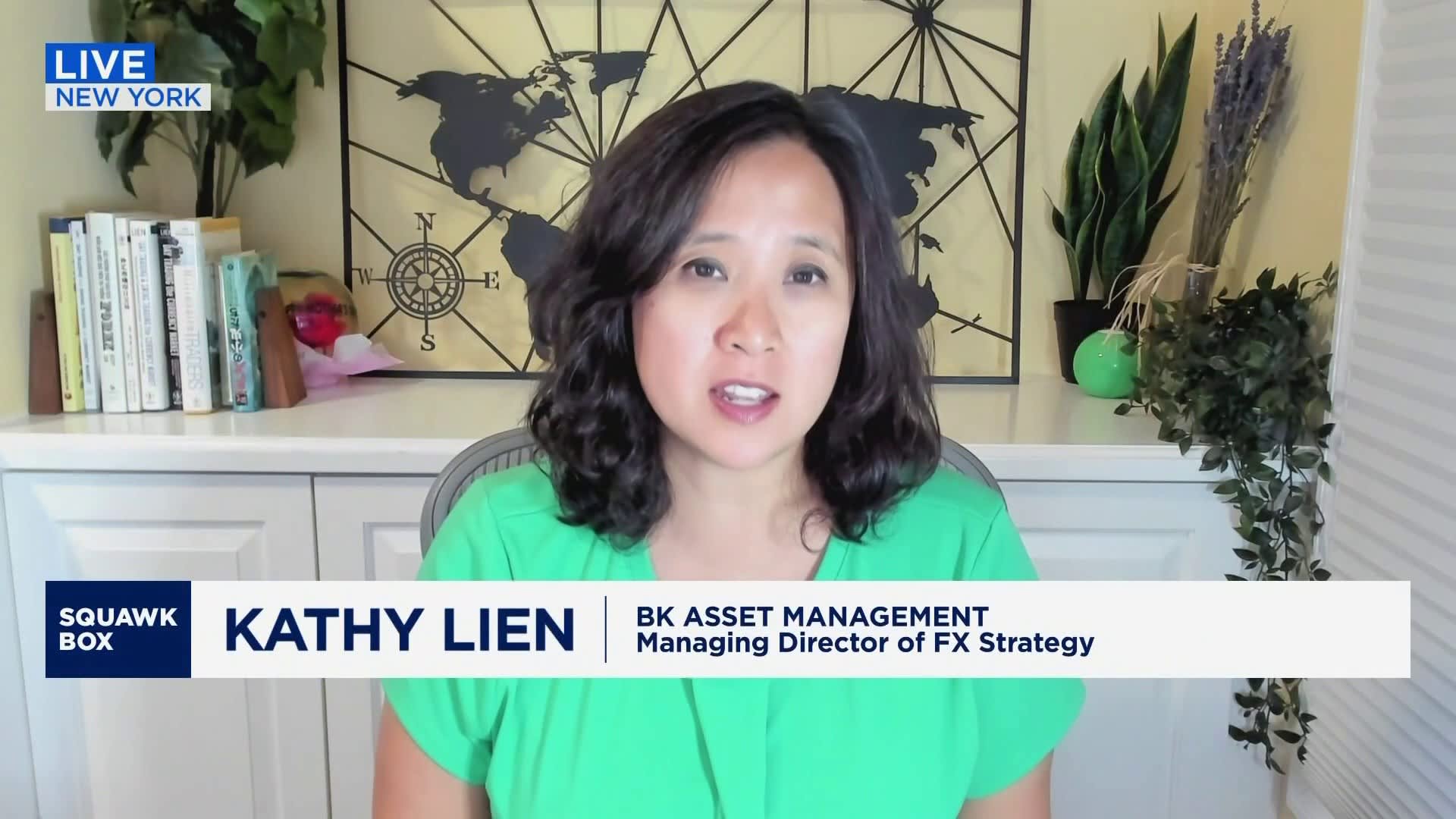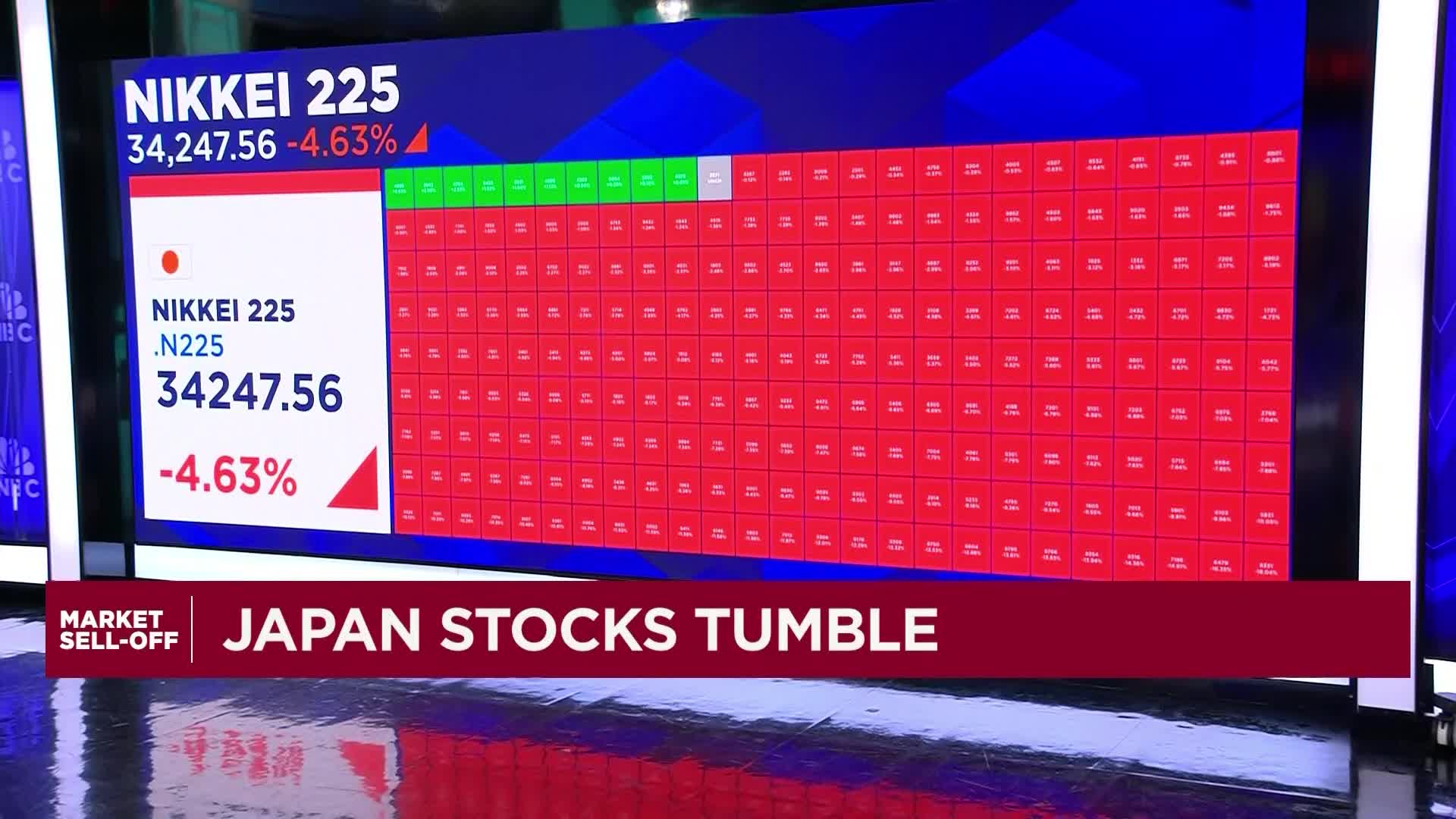Pedestrians walk past a currency exchange shop in central Tokyo on April 17, 2024.
Richard A. Brooks | Afp | Getty Images
Rapid interest rate cuts from the Federal Reserve could make matters worse for the global “carry trade” unwind, according to economists at TS Lombard.
The warning comes as market participants seek to aggressively roll back on carry trades following a dramatic global sell-off in risk assets.
Carry trades refer to operations wherein an investor borrows in a currency with low interest rates, such as the Japanese yen, and reinvests the proceeds in higher-yielding assets elsewhere. The trading strategy has been hugely popular in recent years.
Stock markets in Europe were unsettled on Tuesday, paring earlier gains amid a faltering sense of relief.
An August stocks slump has been partly driven by weaker-than-expected U.S. economic data at the end of last week. The readings led investors to worry that the Federal Reserve may be behind the curve in cutting interest rates to fend off a recession.
“The natural reaction from the Fed to soft labour market data and fresh recession risks would be to cut rates and to do so relatively rapidly. But this would exacerbate any carry trade unwind,” economists at TS Lombard said in a research note published Monday.
“The US economy should trump all else, but it would make sense for central bankers to be cautious,” they added.
‘Triple whammy’
Led by Freya Beamish, economists at the investment strategy research firm said they hoped to see a coordinated message from the Bank of Japan and Fed to soothe market nerves.
“Then if the carry trade unwind really is a problem, we’d hope these central banks would take steps to introduce some form of quantity measures that would help prevent Japanese and other investors that have run on yen carry trades from having to sell assets, and facilitate the Fed cutting rates in due course without exacerbating financial fragilities,” economists at TS Lombard said.
A spokesperson for the Federal Reserve declined to comment when contacted by CNBC on Tuesday.

Traditional safe haven assets, such as the yen and Swiss franc, surged on Monday, fueling speculation that investors were seeking to quickly unload profitable carry trades to cover their losses elsewhere.
The Japanese currency has risen sharply against the U.S. dollar in recent weeks, trading at 145.07 per dollar at 1:10 p.m. London time on Tuesday. It marks a stark contrast from the run-up to the July 4th U.S. holiday, when the yen fell to 161.96 per dollar for the first time since December 1986.
Strategists at HSBC said there had essentially been a “triple whammy” of concerns in recent days, citing the unwind of carry trades, the monetization of artificial intelligence and the prospect of an imminent U.S. recession.
The Japanese national flag is seen at the Bank of Japan (BoJ) headquarters in Tokyo on July 31, 2024. The Bank of Japan lifted its main interest rate on July 31 for just the second time in 17 years in another step away from its massive monetary easing programme.
Kazuhiro Nogi | Afp | Getty Images
“We think it’s too early to buy just yet, but fundamentals are still broadly supportive,” HSBC strategists said in a research note published Tuesday.
“We think the biggest risk now is a self-feeding sell-off that would eventually prompt a recession, given negative wealth effects and tighter credit conditions,” they added.
‘Reawakened with a vengeance’
Kit Juckes, chief foreign exchange strategist at Societe Generale, said in a recent research note that “the big carry unwind is underway.”
“You can’t unwind the biggest carry trade the world has ever seen without breaking a few heads. That is the impression markets give us this morning,” Juckes said on Monday.
Juckes flagged that the biggest foreign exchange market reaction was still one of “position reduction.” He said long positions against the Japanese yen for the Australian dollar, British pound, Norwegian krone and U.S. dollar were all being taken off.
A push below 140 a dollar for the Japanese yen in the near term “would be unsustainable given the impact on equities and inflation,” he added.

Economists at TS Lombard said Monday that global assets — from the U.S. to China — “look exposed.”
“Maturity mismatch in the external balance sheet, built up over years of BoJ excess accommodation, drove Japanese investors out of foreign assets as the curve flattened though the early part of the pandemic,” they continued.
“But monetary divergence since the Fed started raising rates then presented a new opportunity – the old carry trade reawakened with a vengeance.”
— CNBC’s Michael Bloom contributed to this report.

